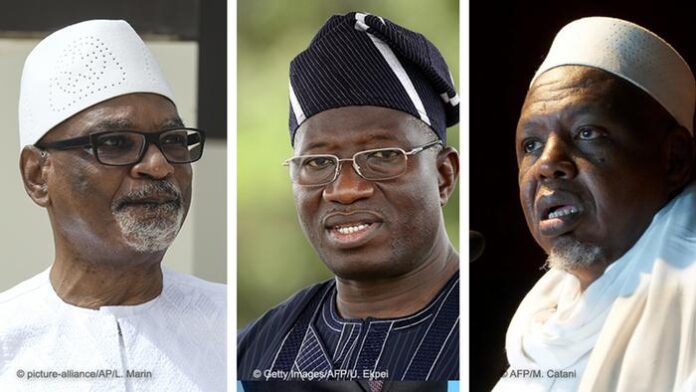West African leaders are racing to resolve the political crisis in Mali. The instabilty is seen as a dangerous development in the Sahel region, where terrorists and separatists already pose a threat.
The Economic Commission of West African States (ECOWAS) was on Monday holding an extraordinary virtual summit on the socio-political situation in Mali.
On July 24, a group of ECOWAS leaders failed in their attempts to bring together Mali’s President Ibrahim Boubacar Keita and a coalition of opposition groups. None of the parties were willing to make concessions, bringing the mediation to a standstill. The mediation efforts come after several weeks of violent protests, during which dozens of people were killed.
Calls for Keita’s departure
The coalition led by popular cleric Mahmoud Dicko accuses Keita’s administration of bad governance and has called for his resignation. But a spokesman for Keita’s camp described the calls for the president’s resignation as unconstitutional.
Mediators have also ruled out Keita’s resignation.
“Opposition members know that there’s a red line they cannot cross of calling for Keita’s departure,” Pope Ibrahima Kane, in charge of relations at the African Union’s Open Society Foundation, told DW.
“They have served in government before and held senior positions. Therefore, they know ECOWAS rules concerning unconstitutional changes of government,” Kane said.
The mediators — led by former Nigerian president Goodluck Jonathan — had proposed a roadmap that would lead Mali out of its ongoing crisis.
They convinced the government that a power-sharing deal led by President Keita was an option to break the impasse.
Under this route, the formation of a transitional government would see the ruling coalition take up 50% of the seats in the government, leaving 30% for the opposition and 20% for civil society groups.
Read more: Mali: President Keita dissolves constitutional court amid unrest
Former Nigerian president Goodluck Jonathan stepped aside peacefully after losing the 2015 presidential election to Muhammadu Buhari
Goodluck Jonathan key figure in mediation
The mediators also suggested appointing new judges to the country’s constitutional court to resolve a dispute over the March-April parliamentary election.
However, the opposition refused to take the deal. Instead, they are demanding the resignation of Keita — a proposal that ECOWAS mediators did not bring to the table.
“It’s a red line,” said Jean Claude Kassi Brou, the president of the ECOWAS Commission. “There’s a constitution that governs the country: The constitution must be respected. If you don’t recognize the constitution, the door is open to everything.”
As the head of the ECOWAS mission, Jonathan is playing a key role in the mediation process. As the former leader of a large West African country, experts see him as an instrumental figure.
“ECOWAS cannot come to Bamako and see to the setting up of an interim government,” Jonathan said. “We have to take one step at a time.”
ECOWAS stands firm on democratic principles
Johnathan is notable for having gracefully complied with the democratic process in his own country when he accepted his election defeat in 2015. But there are other elements to his leadership that may complicate the current peace efforts initiated by ECOWAS.
“Goodluck Jonathan’s mission was always going to be a challenge for reasons including his lack of expertise on Mali, his lack of fluency in French and, probably most of all, his Christianity, which renders him unpalatable for the more hardline religious factions involved in the negotiations,” DW’s West African correspondent Bram Posthumus explained.
Experts say ECOWAS could not support Keita’s resignation because he was elected to his current term in 2018 in an election that was recognized as democratic and entirely legitimate.
“It would set a dangerous precedent for West Africa if he was forced out,” Paul Melly, a consulting fellow for the Africa Program at Chatham House told DW.
Why is the opposition refusing the deal?
Mali’s M5 movement — a coalition of political, religious and civil society leaders — says it has lost confidence in ECOWAS to handle the current impasse.
“We do not expect anything more from them,” Mohamed Assaley Ag Ibrahim, a member of M5 said. “We will continue to demonstrate peacefully using all legal means to remove Keita and his regime.”
The majority of the opposition does not trust Keita to give them meaningful influence in a unity government. According to Melly, if opposition figures are to share responsibility for the difficult compromises needed to advance the peace process, they have to feel they are players in making those decisions. “Trust is a big challenge and it has been severely eroded,” Melly said.
However, Bram Posthumus believes there are more issues to iron out. “It seems to me that the idea of a power-sharing deal was discussed but not the details, especially ministerial posts or maybe even lucrative directorships of various parastatal bodies,” he explained. “And this is where these power-sharing deals usually come unstuck.”
Mali’s opposition and their supporters have repeatedly asked for the resignation of President Ibrahim Boabacar Keita
The genesis of the current crisis
Much of the current tension was sparked in April when the constitutional court tossed out 31 results from the parliamentary elections, which led to protests.
The so-called June 5 movement (M5) then emerged, channeling their anger over a range of issues. They staged two mass rallies demanding Keita’s resignation in June, before organizing the July 10 rally which turned violent.
The movement is led by influential imam Mahmoud Dicko, despite him not being a formal member.
The standoff between M5 and President Keita last week spiraled again into violent clashes that left nearly a dozen people dead.
M5 blames Keita for failing to tackle corruption, an economy in tatters, and the country’s eight-year-long jihadist conflict.

